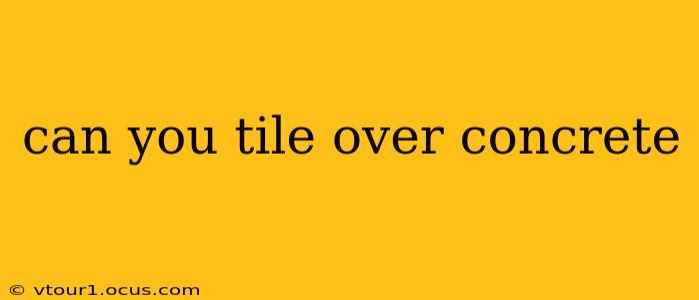Can You Tile Over Concrete? A Comprehensive Guide
Yes, you absolutely can tile over concrete, making it a popular choice for floors, walls, and even countertops in various settings. However, the success of your tiling project depends heavily on proper preparation and the right techniques. This comprehensive guide will explore the intricacies of tiling over concrete, addressing common concerns and ensuring a long-lasting, beautiful finish.
What Type of Concrete is Best for Tiling?
The success of tiling directly onto concrete is largely determined by the condition of the substrate. Ideally, your concrete should be:
- Clean and Dry: Any dust, debris, oil, or moisture will hinder the adhesive's bond, leading to tile failure. Thorough cleaning is paramount.
- Solid and Stable: Cracked, crumbling, or otherwise unstable concrete needs to be repaired before tiling. Minor cracks can be patched; significant structural issues require more extensive remediation.
- Level and Smooth: Uneven concrete will result in an uneven tile surface. Significant imperfections need to be leveled using self-leveling compound.
- Cured Properly: Newly poured concrete needs adequate curing time (usually 28-30 days) to achieve sufficient strength before tiling. Premature tiling can lead to cracking and tile displacement.
How to Prepare Concrete for Tiling: A Step-by-Step Guide
Preparing the concrete is arguably the most crucial step in the entire process. Here's a breakdown:
- Clean the Surface: Remove all loose debris, dust, and dirt using a stiff brush, vacuum, and potentially a pressure washer (use cautiously to avoid damaging the concrete).
- Repair Any Cracks or Damages: Fill any cracks or holes using a suitable concrete patching compound. Allow ample drying time as per the manufacturer's instructions.
- Prime the Surface (Often Necessary): A concrete primer improves adhesion, especially with porous or absorbent concrete. Choose a primer specifically designed for use with tile adhesive.
- Level the Surface (If Necessary): For uneven concrete, apply a self-leveling compound. Follow the manufacturer's instructions carefully for optimal results. Ensure the compound is completely dry before proceeding.
What Kind of Adhesive Should I Use to Tile Over Concrete?
The type of adhesive you choose significantly impacts the longevity of your tile installation. Modified thin-set mortar is the most common and recommended adhesive for tiling over concrete. Always choose a mortar appropriate for the type of tile you are using (e.g., ceramic, porcelain, natural stone). Follow the manufacturer's instructions meticulously regarding mixing ratios and application techniques.
What About Moisture Barriers? Do I Need One?
Whether or not you need a moisture barrier depends on several factors:
- Location: Basements and areas prone to moisture require a moisture barrier to prevent water damage and tile failure.
- Concrete Type: Porous concrete is more susceptible to moisture penetration and may benefit from a barrier.
- Tile Type: Certain tiles are more vulnerable to moisture damage than others.
A vapor barrier, like polyethylene sheeting, can be installed beneath the tile adhesive to prevent moisture migration. However, this isn't always necessary, particularly in dry, well-ventilated areas.
Can I Tile Over Existing Tiles on Concrete?
Tiling over existing tiles is possible, but it's generally not recommended unless the existing tiles are securely bonded and in excellent condition. Any loose or cracked tiles must be removed and the surface prepared as described above. Adding another layer of tile will increase the overall thickness of the flooring, potentially creating issues with doors and transitions to other flooring types.
What are the Potential Problems When Tiling Over Concrete?
- Poor Adhesion: Improper preparation, moisture issues, or incorrect adhesive selection can lead to tile detachment.
- Cracking: Underlying concrete cracks can propagate through the tile, causing damage.
- Uneven Surface: Failure to level the concrete properly results in an uneven tile surface.
- Moisture Damage: Water intrusion can cause damage to the tiles and the underlying concrete.
By following these guidelines and paying close attention to detail, you can successfully tile over concrete, creating a durable and aesthetically pleasing surface that will last for years to come. Remember, if you are unsure about any aspect of the process, consulting a professional tiler is always recommended.
